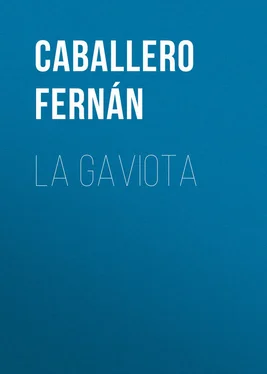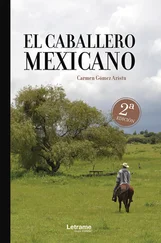Fernán Caballero - La Gaviota
Здесь есть возможность читать онлайн «Fernán Caballero - La Gaviota» — ознакомительный отрывок электронной книги совершенно бесплатно, а после прочтения отрывка купить полную версию. В некоторых случаях можно слушать аудио, скачать через торрент в формате fb2 и присутствует краткое содержание. Жанр: foreign_antique, foreign_prose, на английском языке. Описание произведения, (предисловие) а так же отзывы посетителей доступны на портале библиотеки ЛибКат.
- Название:La Gaviota
- Автор:
- Жанр:
- Год:неизвестен
- ISBN:нет данных
- Рейтинг книги:3 / 5. Голосов: 1
-
Избранное:Добавить в избранное
- Отзывы:
-
Ваша оценка:
- 60
- 1
- 2
- 3
- 4
- 5
La Gaviota: краткое содержание, описание и аннотация
Предлагаем к чтению аннотацию, описание, краткое содержание или предисловие (зависит от того, что написал сам автор книги «La Gaviota»). Если вы не нашли необходимую информацию о книге — напишите в комментариях, мы постараемся отыскать её.
La Gaviota — читать онлайн ознакомительный отрывок
Ниже представлен текст книги, разбитый по страницам. Система сохранения места последней прочитанной страницы, позволяет с удобством читать онлайн бесплатно книгу «La Gaviota», без необходимости каждый раз заново искать на чём Вы остановились. Поставьте закладку, и сможете в любой момент перейти на страницу, на которой закончили чтение.
Интервал:
Закладка:
“The commandant! The commandant!” was the general cry.
“Do you come from your citadel, San Cristobal?” asked Manuel of Don Modesto, after exchanging the preliminary compliments, and an invitation to be seated on the same stone bench where Stein was seated.
“You might join my mother, who is so good a Christian, to pray to the saints to build again the walls of the fort, contrary to that which, by report, Joshua did at the walls of Jericho.”
“I have to ask of the Lord things more important than that,” replied the grandma.
“Certainly,” said brother Gabriel, “Maria has more important things than the reconstruction of the walls of a fort to ask of the Lord. It would be better of her to implore Him to reconstruct the convent.”
Don Modesto, on hearing these words, turned with a severe gesture towards the monk, who, at this moment, went and placed himself behind the old mother, and dissimulated so well, that he disappeared almost entirely to the eyes of the others present.
“After what I see,” continued the old commandant, “brother Gabriel does not belong to the church militant. Do you not remember that the Jews, before building their Temple, had conquered the promised land, sword in hand? Would there have been churches and priests in the Holy Land if the crosses had not conquered it, lance in hand?”
“But,” then said Stein, with the laudable intention to divert from this discussion the commandant, whose bile commenced to be stirred, “why does Maria ask for what is impossible?”
“That signifies little,” replied Manuel; “all old women act the same, except she who asked God to tell her a good number in the drawing of a lottery.”
“Was it sent her?” they asked.
“It had been well kept, if I had gained the prize. He who could do all things, where the miracle?”
“That which is certain,” declared Don Modesto, “is, that I will be very grateful to the Lord, if he will inspire the government with the happy idea of re-establishing the fort of San Cristobal.”
“To rebuild, would you say?” observed Manuel; “take care and repent at once, as it happened to a woman consecrated to the Lord, and who had a daughter so ugly, so stupid, and so awkward, that she could not find even a despairing man to espouse her. The poor woman, much embarrassed, passed all her days on her knees at prayer, asking a husband for her daughter. At last one presented himself: the joy of the mother was extreme, but of short duration. The son-in-law was so bad, he so maltreated his wife and his mother-in-law, that the latter went to the church, and there posted before the saint this inscription:
‘Saint Christopher! with hands and feet,
Whose measure could a giant’s meet!
(And with a head of bony horns),
Is’t thou among the saints I saw?
Thou – Jewish as my son-in-law.’ ”
While the conversation was going on, Morrongo, the house cat, awoke from a long sleep, bent his croup like the back of a camel, uttered a sharp mew, opened out his mustaches, and approached, little by little, towards Don Modesto, just so as to place himself behind the perfumed pocket suspended to the baton. He immediately received on his velvet paws a little stone thrown by Momo, with that singular address which children of his age so well know how to cast. The cat skipped off in a gallop, but lost no time in returning to his post of observation, and made believe to sleep. Don Modesto saw him, and lost his tranquillity of mind.
“You have not said, Señor Commandant, how Marisalada is?”
“Ill, very ill, she grows weaker every day. I am much afflicted to see her poor father, who has had so much to suffer. This morning his daughter had a high fever; her cough did not quit her for an instant.”
“What do you say, Señor Commandant?” cried Maria.
“Don Frederico, you who have made such wonderful cures, you who have extracted a stone from brother Gabriel and restored the sight of Momo, can you not do something for this poor creature?”
“With great pleasure,” replied Stein; “I will do all in my power to relieve her.”
“And God will repay you. To-morrow morning we will go and see her. To-day you are too much fatigued from your walk.”
“I am not jealous of his kind,” said Momo, grumbling. “The proudest girl – ”
“That is not so,” exclaimed the old woman; “she is a little wild, a little ferocious; one can see she has been educated alone, and allowed to have her own way by a father more gentle than a dove, although a little rough in manner, like all good sailors. But Momo cannot bear Marisalada, since one day when she called him Romo (flat-nosed), as indeed he is.”
At this moment a noise was heard; it was the commandant pursuing at a quick pace the thief Morrongo, who had deceived the vigilance of his master and ran off with the stock fish.
“My commandant,” cried out Manuel to him, laughing, “the sardine which the cat carries will not come to the dish except late or never, but I have here a partridge in exchange.”
Don Modesto seized the partridge, thanked him, took leave of the company, and went away, inveighing against cats.
During all this scene, Dolores had given the breast to her nursing infant; she tried to hush him to sleep, cradling him in her arms and singing to him:
“There high on Calvary, in their fresh retreats,
Woods of olives, wood of perfume meets;
A nightingale – four larks – whose breath,
Would warble forth a Saviour’s death.”
For those who suppress the circulation of poetry of the people, as the child crushes with its hand the feeblest butterfly, it would be difficult to say why larks and nightingales warble the death of Christ; why the swallow plucked out the thorns of his crown; why the rosemary is an object of veneration, in the belief that the Virgin dried the swaddling-clothes of the infant Jesus on a bush of this plant? Why, or rather how do they know that the willow is a tree of bad augury, since Judas hung himself on a branch of this tree? Why does no misfortune ever happen in a house if it has been perfumed with rosemary during Christmas eve? Why in the flower which is called the passion-flower are found all the instruments of the passion of Christ? In truth, there are no answers to these questions. The people do not possess them, nor demand them. These beliefs have accumulated like the vague sounds of distant music, without research into their origin, without analyzing their authenticity.
“But, Don Frederico,” said Maria, while Stein was occupied with reflections on the proceedings, “you have not told us how you find our village.”
“I have seen nothing,” replied Stein, “save only the chapel of our Lord of Good-Help.”
“Miraculous chapel, Don Frederico. Hold,” pursued the old woman, after some instants of silence, “the only motive why I am not as much pleased here as in the village is, that I cannot follow out my devotions. Yes, Manuel, thy father, who had not been a soldier, thought like me. My poor husband! – he is in heaven – my poor husband was brother of Rosaire of the dawn; Rosaire who went out after midnight to pray for souls. Fatigued with a long day’s work he slept profoundly; and precisely at midnight a brother rang a bell, came to the door, and chanted:
‘Here is then the faithful bell!
It is not she the warnings tell;
Of thy parents ’tis the voice!
The cross’s foot then make thy choice;
Raise thee, my son, so full of zeal,
And prayerful in the chapel kneel.
On thy knees in the holy place,
For parents supplicate God’s grace.’
When thy father heard this chant, he felt no longer fatigue nor need of sleep. In the twinkling of an eye he got up and followed the other brother. It seems to me I yet hear him singing in the distance:
Читать дальшеИнтервал:
Закладка:
Похожие книги на «La Gaviota»
Представляем Вашему вниманию похожие книги на «La Gaviota» списком для выбора. Мы отобрали схожую по названию и смыслу литературу в надежде предоставить читателям больше вариантов отыскать новые, интересные, ещё непрочитанные произведения.
Обсуждение, отзывы о книге «La Gaviota» и просто собственные мнения читателей. Оставьте ваши комментарии, напишите, что Вы думаете о произведении, его смысле или главных героях. Укажите что конкретно понравилось, а что нет, и почему Вы так считаете.











